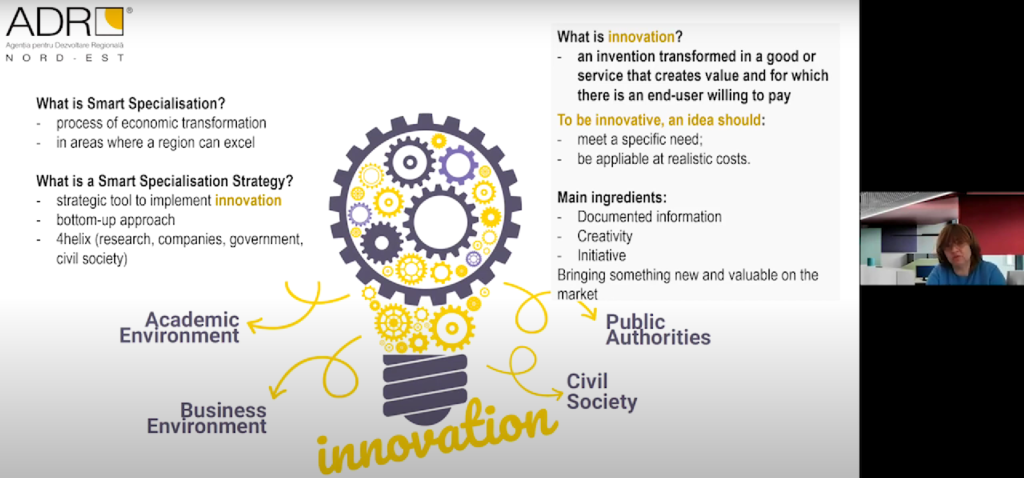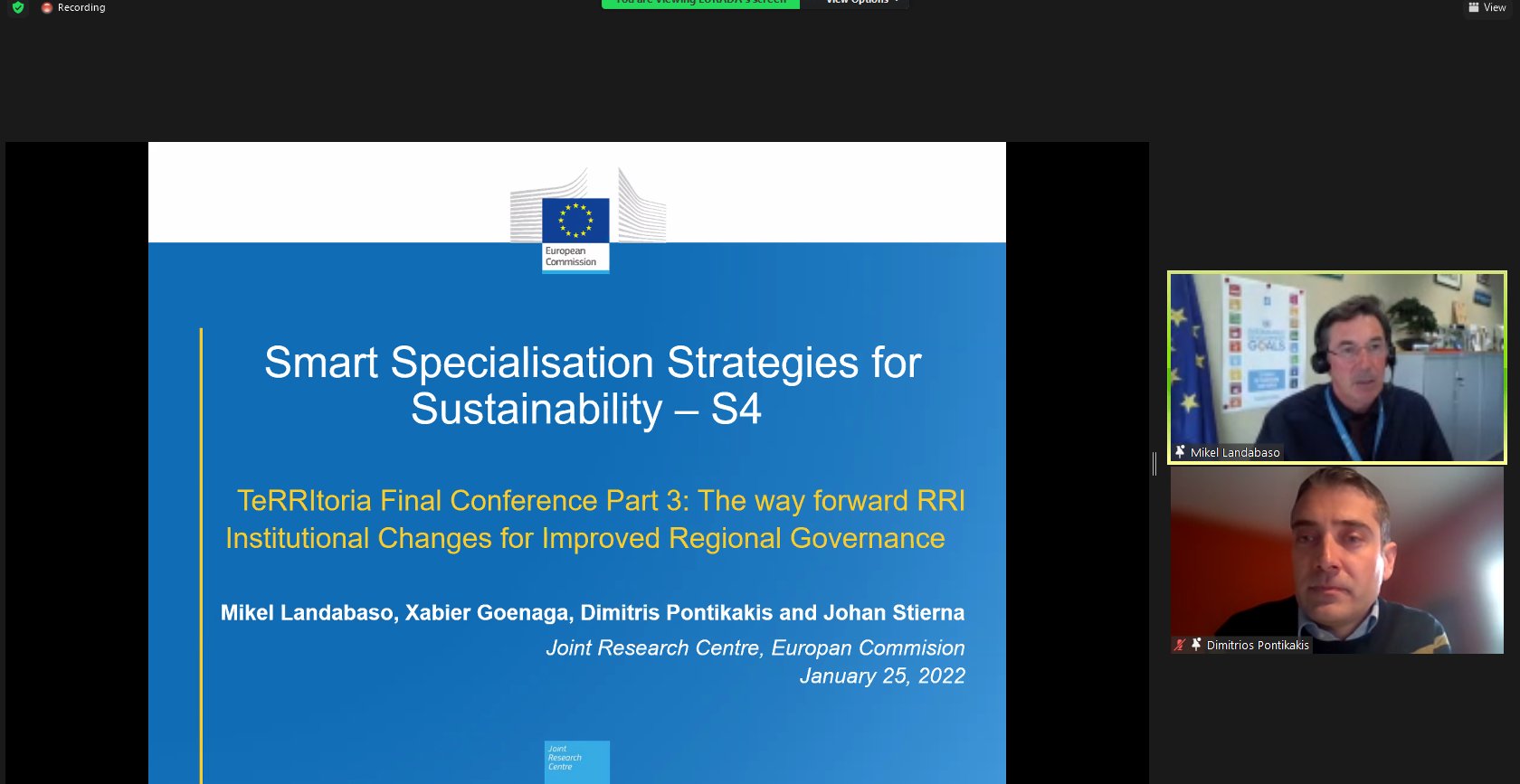9th dialogue #ResponsibleRegions – The Research and Innovation Strategy for Smart Specialisation of North-East Romania
TeRRItoria’s ninth #ResponsibleRegions dialogue was held on the 23rd of September 2021. The topic for this instalment was the new Smart Specialisation Strategy of ADR Nord Est.
Agatha Fillimon, Head of Sectoral Specialisation Office. Communication, Innovation and External Cooperation Directorate at ADR Nord Est, explained to the audience how ADR Nord Est is dealing with public engagement, entrepreneurial discovery process and how they are trying to motivate people to be innovator in a remote and mountain area in order to better define their Regional Research and Innovation Strategies for Smart Specialisation (RIS3).
ADR Nord Est is a moderate-to-low innovator region according to the Regional Innovator Scoreboard 2021. The new RIS3 is addressing the representative of economic sectors with regional competitive advantages to those who influence the innovation processes such the quadruple helix sector. The academia environment anticipates the socio-economic challenges before they get worst and it brings knowledge to the regional innovation ecosystem, while the business environment generates innovation and confirms the innovation absorption capacity. Public authorities play an important role as well since they support the transfer of innovation for local/regional development goals, and they facilitate the public-private partnership for innovation. Civil society, nevertheless, facilitate the mobilisation of the local stakeholders. Associations of producers and consumers were involved in the realisation of the new RIS3 2021-2027. Social enterprises were also a target group of the preparatory research study to develop the new RIS3. ADR Nord Est was looking at local stakeholders which have expertise in innovation.
The Smart Specialisation Strategy (S3) is a collaborative process in North Est Romania. ADR Nord Est is the coordinator of the strategy, and it is supported by the ecosystem of agri-food & wood industry, energy sector, textiles, IT&C, tourism and health. The final decision is taken by the regional development board which is composed by all the public authorities of the regions.
ADR Nord Est, as coordinator of the S3 in the region, initiates the process, develops the strategy, facilitates the dialogue between stakeholders and implements the strategy in the regions. In addition, the staff of ADR Nord Est monitor and evaluate the whole process. Lastly, it coordinates the strategy review and its adaption according to the socio-economic developments. In relation with the stakeholders, ADR Nord Est acts as a facilitator and supports the setting of shared goals and initiatives. Basically, ADR Nord Est is supervising the entire process: development, implementation, promotion, monitoring, evaluation and revision.
Since 2021, ADR Nord Est become Managing Authority for the Regional Operational Programme (ROP) 2021 – 2027. This is the main instrument which finance the innovation at regional level. Until 2020, they were intermediary body, so the final decision was taken by the central government. Now the situation is totally different, ADR Nord Est staff can now directly reply to the needs of the local stakeholders. This process is facilitating the partnership among research and SMEs and so the development of innovation at local level. The fact that now they can control the timing of the implementation process will facilitate the development of innovation at regional level. However, the central government have anyway to approve the ROP.
The main implementing tools of the S3 are the Entrepreneurial Discovery Process (EDP) and the Project Development Lab (PDL). The first one identifies the challenges and develop the vision, while the latter generates innovation ideas, and it is useful to identifies founding opportunities.
In the framework of the TeRRItoria project, ADR Nord Est adapted the EDP method. From regional to small community level; from urban to rural environment; from more specialised to less/not specialised participants. ADR Nord Est manage to create a new tool (a Brokerage Platform for RDI services) to foster development and innovation. It’s a platform for transaction of research and innovation services.
ADR Nord Est faced several challenges in the development of its RIS3. The region has a low innovation propensity and many asymmetries (online media, language and data of intervention focus). In general, a strategy addresses industrial sector, while in North East Romania the main sectors are wooden industry, tourism, and agriculture.
During the 9th dialogue, also the contribution of a panellist was foreseen. Patricia da Costa Félix Bermejo, Project Unit Coordinator at FUNDECYT. FUNDECYT is the Scientific and Technological Park of Extremadura. Extremadura is the region with the second lowest GDP per capita in Spain and faces similar challenges as North East Romania region. Both regions are small and sparsely populated and both are lacking in innovation.
Both regions (North East Romania and Extremadura) suffering about brain drain because the majority of the young people are attracted by the big cities where they have more opportunities. The rural companies of Extremadura are not prepared for intrapreneurship. It’s evident a lack of physical proximity between rural companies and innovation centers. Rural innovation does not come out spontaneously, it has to be nurtured by the local government. Local Action Groups (LAGs) are playing a crucial role in Extremadura in order to realise a local development strategy. LAGs are non-profit associations responsible for the management of the local development strategy of a specific territory in the rural environment. Currently there are 24 LAGs in Extremadura, and one of them was so successful that the methodology developed was transferred at county level and the included in the new S3. The successful example comes from LAG TAGUS. This is a practical example of how to involve key rural stakeholders in Smart Specialisation processes. More than 200 stakeholders were involved in this process and a new business model was developed.
Thanks to the new S3 (and the Covid-19 pandemic), Extremadura is seeing a reversing of the brain drain process. Several young people decided to go back to their small cities and so they brought back their skills and expertise.
After the statement of Patricia, the screen was opened to all the participants which made lots of questions to both Agatha and Patricia. Agatha pointed out that the brain drain problem is affecting Romania as a whole country. In fact, young people first are moving towards the big cities of Romania and then the fly abroad. Covid-19 pandemic is inverting the trend but, theoretically, it is a temporaneous situation.





